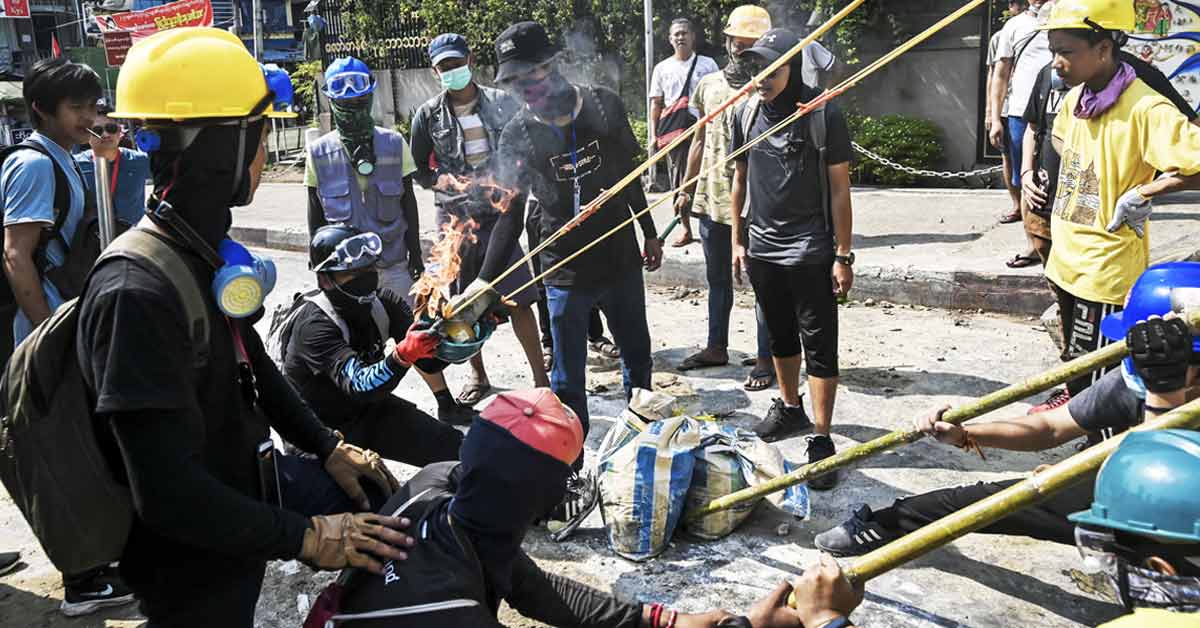Chinese factories torched as mainland workers hunker down under martial law - Beijing is being pulled into the ulcerous crisis in Myanmar, an unravelling country it had carefully stitched into its big plans for Asia.
During a January 2020 visit to Myanmar, Chinese President Xi Jinping elevated the Southeast Asian neighbour to "country of shared destiny" status, Beijing's highest diplomatic stripe.
The aim was to nudge Myanmar decisively towards China - and away from the United States (US) - and drive through projects worth billions of dollars under the Belt and Road Initiative (BRI), including an oil and gas pipeline and a port to the Indian Ocean.
Fast-forward one year, and the strategically located country has tipped into bloody chaos after a coup took out Aung San Suu Kyi's government.
The massive pro-democracy movement which has since unfurled accuses China of waving through the generals' power grab and trading Myanmar's freedom for its own strategic gain.
As Myanmar security forces kill protesters - more than 200 so far - Beijing faces a dilemma: back the men with guns or side with an increasingly anti-China public.
"China doesn't really care who is in government, but it wants a government that will protect Chinese projects and interests," said Richard Horsey, a Myanmar political analyst.
But "this is a military that Beijing doesn't think can bring stability... and the more China tries to build a relationship with that regime, the more the public will be put offside."
'Hostile Environment'
That is laden with danger for Chinese interests.
At least 32 China-owned textile factories were burned down in several Yangon townships on Sunday, according to Chinese state media, causing around US$37 million in damage.
A foreign ministry spokesman in Beijing demanded the immediate protection of "Chinese institutions and personnel".
Chinese businesses were closed Tuesday in the flashpoint areas, leaving workers holed up in a "hostile environment" cloaked by martial law, according to a representative of a garment factory in Yangon's Shwepyitar township.
"All Chinese staff are staying inside the factory... some police have also been stationed there," the spokesperson told reporters in Beijing, requesting anonymity.
Ominous commentaries have since seeped out of Chinese media with one saying Beijing could be prodded "into taking more drastic action... if the authorities cannot deliver and the chaos continues".
Twitter accounts of Myanmar pro-democracy groups allege - without offering clear proof - that the army carried out the factory attacks to justify a crackdown in which dozens of protesters died.
'No Easy Play'
Ripples of anti-China sentiment in Myanmar could become waves across a Southeast Asian region suspicious of China's reach, influence and penchant for debt-trap diplomacy to get BRI projects over the line.
"Any broad-based popular uprising against Chinese interests can be contagious and percolate anti-China grievances through Cambodia, Lao and elsewhere," said Thitinan Pongsudhirak, a professor of political science at Thailand's Chulalongkorn University.
"China had figured out this piece (Myanmar) of its geostrategic puzzle," but now there is "no easy play ahead".
In Myanmar, public anger at Chinese projects has ended major investments before.
Construction of the US$3.6 billion Myitsone dam in northern Kachin State was spiked a decade ago after widespread opposition, while the voracious Chinese market for rare wood, jade and rubies is routinely blamed by the public for driving the resource grab inside Myanmar.
But alongside economic interests, China also craves the legitimacy of global leadership and "can't turn a blind eye to a 'dark dictatorship'" on its doorstep, Thitinan added.
Beijing enjoys exceptional leverage over Myanmar, yet has so far refused to label the military action a coup.
It is the country's top foreign investor and supplies the Tatmadaw (Myanmar army) with military hardware.
Observers say it also maintains alliances with ethnic militias on the long China border, who have been fighting the army for decades.
'Backbone Of Disruption'
China has denied any advance knowledge of the 1 February coup and its official position so far has been to call for de-escalation while supporting "all sides" in Myanmar's post-coup crisis.
On 11 March, it signed a United Nations Security Council statement strongly condemning violence against protesters - a rare act by Beijing, which has previously shielded Myanmar at the UN over alleged genocide against the Rohingya.
Still, China remains a potential referee, said Soe Myint Aung, a political analyst from the Yangon Center for Independent Research.
"China can play a direct or indirect mediating role for a negotiated compromise," he said.
But first, it will have to chip back at the anger and suspicion in Myanmar.
Anti-Beijing placards are now common at protests, where rumours of Chinese military flights bounce around, while the internet grumbles with memes urging a boycott of everything Chinese, from computer games to Huawei phones and TikTok.
"China babysits the Tatmadaw, it is the backbone of disruption in our country," said one pro-democracy supporter in Yangon, requesting anonymity.
"China has dug up our jade and jewels, taken our oil and now it wants to cut our country in half with its pipeline." - AFP
